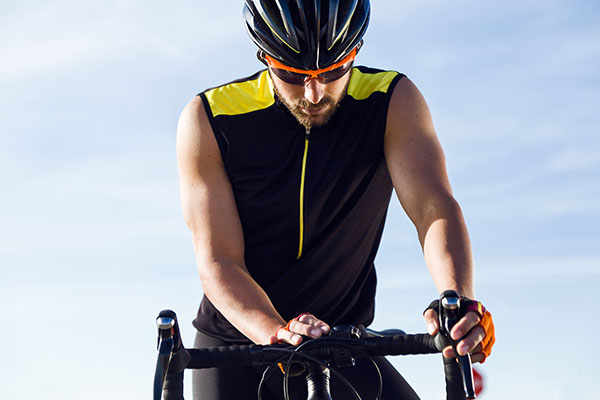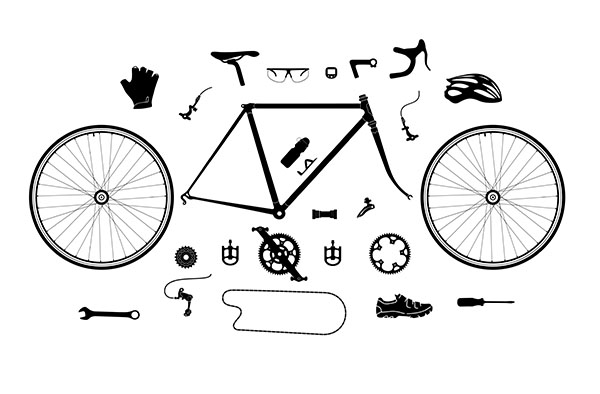Contents
How Long Does It Take To Bike 20 Miles?
You can bike 20 miles in right around an hour.
Biking is a fantastic low-impact, aerobic exercise. This makes it a great option for just about everyone!
Maybe you’ve been riding for a while, or maybe you are new to the sport.
At some point, you will probably start riding longer distances.
However, you may be curious how long it will take you to finish those longer rides.

How long does it take to bike 20 miles?
This is a valid question, because while we all enjoy our exercise we also have other life constraints to factor in.
Maybe you have to get your ride in before work or before you have to rush to pick up your children.
Your ride might even be a commute for you. So, it’s important to get a general idea of how long it takes to bike 20 miles.
You can probably bike 20 miles in right around an hour – give or take.
Biking that far is great exercise. There are so many health benefits that you get from bike riding!
The time that this ride may take will vary from person to person.
There are several factors that contribute to this, such as your personal fitness level, the route you are going to ride, the weather, and the bike you ride.
Your Fitness
How often do you ride? If you ride more frequently, this will be to your advantage.
You will be more conditioned for these distances, and you can make a more informed guess about how long certain rides take you.
The more consistent you are with logging higher mileage rides, the more efficient you will become.
Is this your first time riding a bike 20 miles or do you ride that far frequently?
It is even more likely that you can do this in a shorter amount of time if you are used to riding these distances and know how long it takes.
If you know your average speed, you can better determine how long your ride will take.
For example, the average rider’s speed is about 17 mph. At that speed, a 20 mile bike ride will take about 1 hour and 40 minutes.
In order to hit it on the 1 hour mark you need your speed to average about 20 mph.

Maybe you routinely bike 10 miles and can use that to get a general idea of your ride time.
Think of it in terms of two 10 mile rides and that will give you a rough estimate.
But, it will probably still be faster than your actual time since you will get more fatigued on the longer route and because of any necessary breaks you need to take.
What is your current cardiovascular fitness level? Do you walk, run or swim?
If you have a good aerobic base, then you will be in better shape than someone that does less aerobic activity.
Walking, running, or swimming are some great cross-training exercises that also improve your aerobic fitness.
How is your leg strength? If you weight train and have powerful leg muscles, that will help you.
Your legs will be stronger and more prepared to deal with any changes in elevation.
Your current fitness level is probably the most significant factor in how long it will take you to bike 20 miles.
Your Route
Will you be biking uphill or downhill most of the 20 miles? Are you going to cover areas that contain gravel or have potholes?
If so, be prepared for any flat tires that may occur. Don’t go out without being prepared to deal with flat tires.
It would be extremely frustrating to forget your supplies and have no way to fix your flat.
You don’t want to be stranded or having to call someone for help.

Will it be smooth asphalt the whole way? Will it be a busy roadway or one that has no cars at all?
These factors affect how long it will take to bike your 20 miles.
Hills are going to be more taxing on your body, and if you are navigating uneven terrain, that may slow you down even more.
If the roadway is busy, that will also affect your ability to maintain a constant speed during your ride while adhering to traffic laws.
You must also be more vigilant of your safety around cars.
Your Bike
Your bike will be a determining factor in your speed. Is it a mountain bike with knobby tires?
If so, it will probably take you longer.
You should consider swapping your knobby mountain bike tires out for smooth tires if you want to ride it this distance.
The smooth tires will allow for a faster ride and less exhaustion for your body if you are traveling on a flat, paved surface.
Is it a road bike with street tires? This will be the best for riding this distance.
Is it a cruiser bike?
Does your bike have gears? This will be very important.
If you are riding a mountain bike for instance, with smooth tires on it, that bike will have more low gears optimized for climbing mountains.
A road bike will have higher gears in order to reach better top speeds.

Does your bike fit your body size correctly? If not, it might negatively affect your bike ride.
Making sure your bike size is right for you can be very important.
It will make your ride more comfortable, but more than that it will help prevent injury.
There are many things to consider when choosing the right bike size for your body.
It takes more than knowing your height and basing your decision on that. The most critical element should be choosing the correct frame size.
If the fit is not correct, you could experience wrist pain, extra fatigue, and increased crash potential.
All these factors influence how long it takes to bike 20 miles.
The different types of bikes are very diverse and your bike’s style will dictate the best terrain for your planned 20 mile route.
There are some key differences to consider when thinking about your bike:
Road Bikes – they perform best on smooth pavement. Their tires are slender.
They have “drop” handlebars. Usually, they are lighter than the other bike types.
Mountain Bikes – they are perfect for those rough off-road trails.
The handlebars are flat and upright for maintaining good control. The gear range is low in order to climb up steep inclines.
Typically, mountain bikes have some suspension to allow a smoother ride.
You can use mountain bikes for touring or commuting.
Some mountain bikes such as fat bikes have extremely wide tires.
Hybrid bikes – These bikes were created to bridge the gap between road bikes and mountain bikes.
They have large padded seats and the handlebars are upright.
This type of bike is ideal for paved or unpaved rides, but not recommended for off-road trail rides.
The tires are a medium width and their tread is semi-smooth.
This allows for smooth rides on pavement, and it provides enough stability on unpaved routes. They can either be rigid or have front suspension.
Make an informed decision when choosing your bike type.
Choosing the correct bike can improve your planned 20 mile bike ride by picking the terrain and bike that optimizes your performance.
Biking Gear
Before you set out on your long ride, be sure you are going out prepared.
Failure to carry any of the necessary items might make your biking trip a lot longer and cause unnecessary stress.
Like if you have a flat, for example. Make yourself a check-list to ensure that you have everything that you need.

Here are some things to add to your list:
- On Your Person
- Appropriate clothing – bike shorts (definitely considered wearing padded shorts), bike jersey
- Sunscreen – don’t forget to protect your skin! Apply 15 minutes before getting outdoors.
- Bike shoes
- Helmet
- Sunglasses
- Rain gear (if needed)
- Cold gear (if needed)
- Under your seat
- Under-saddle bag
- 2 Spare Tubes
- Multi-tool for removing the tire and changing the inner tube.
- Emergency Patches
- Tire Lever
- CO2 and dispenser (or hand pump)
- On the handlebar
- Charged GPS – don’t forget to charge the night before
- Charged Phone – also make sure you charge it fully
- On the frame
- Hydration bottles – both water and electrolytes. Premix any necessary electrolytes.
- In your pockets
- Gels, chews, or any fuel that you prefer.
- Cash just in case of emergency – you may find yourself in need of an extra drink or some food if you bonk.
It is best to always be prepared, so take the time to make a list and ease your mind of extra stressors.
This list will get you started, but be sure to add anything essential for your personal needs.
Weather
Will it be clear or storming? Will it be 110 degrees or -20 degrees?
Weather can definitely affect how long it takes to bike 20 miles.
It will take longer if you are working with unfavorable weather conditions such as rain, snow, or ice.

If it is raining, it will make your ride slower than if the sun was shining.
But if it’s too hot, that will also slow you down and mean that you need better hydration and fueling.
Rest Breaks
You should also consider rest or water breaks.
If you require breaks or need to stop to use the restroom, make sure you account for those. I’m that friend that always needs to stop for a bathroom break.
If you are that person too, then keep that in mind when planning your route.
The amount of rest breaks that you need will add on to how long you take to bike 20 miles.
Biking More than 20 Miles
You can use how long it took to bike 20 miles as an estimate of what it will take to bike other similar distances.
But, can you use it as an estimate of how long it will take to bike much longer distances? Not really.
The miles will wear on you exponentially.
When biking for distances longer than 20 miles your body will slowly stop being as efficient as you were at the beginning of your ride.
The further your ride, the more fatigued you will be. And if you had to do any hills, that is even more taxing on your body and energy levels.
Conclusion
So, how long does it take to bike 20 miles? It may take you an hour or it could take you 2 hours to bike 20 miles.
The time will vary from person to person.
Your fitness level, the bike you ride, your route’s terrain, the weather, and your gear may all play into how long it takes to bike 20 miles.
Don’t forget to be prepared. Make yourself a list and get all of your gear together the night before your 20 mile bike ride.
Most importantly, don’t forget to have fun and enjoy your ride.
Whether it’s a leisurely ride or you are working to better your time or speed, you are definitely getting amazing health benefits.
Don’t compare yourself to other riders. Ride your bike and be consistent. Your speeds will improve and so will your health!




